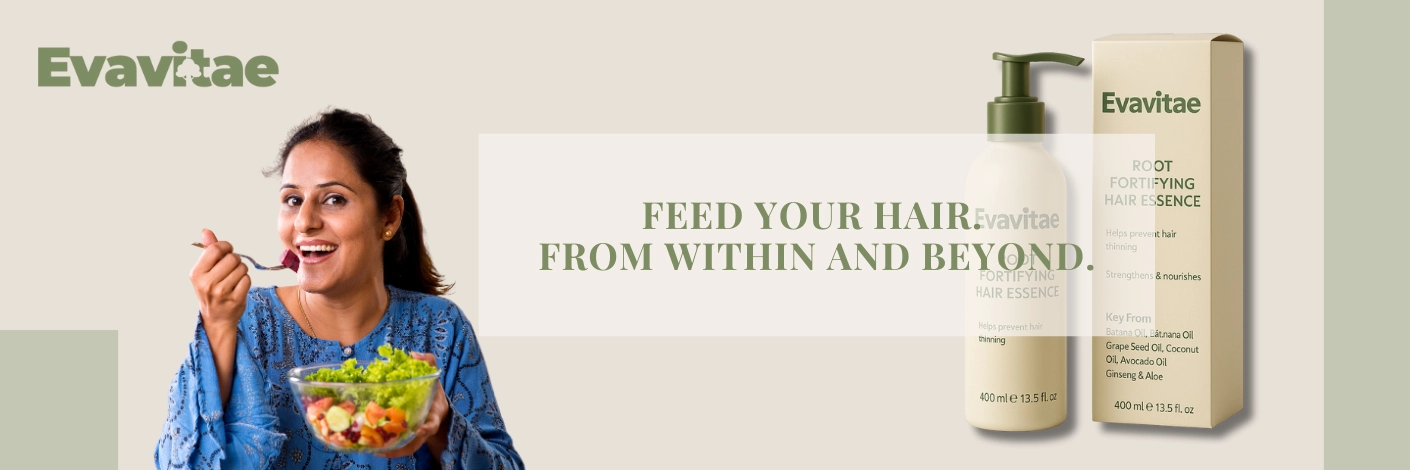
Hair health begins from within. While topical treatments and scalp care are essential, what you eat plays a major role in supporting the structure, strength, and growth of your hair. Nutrients from your daily meals fuel the follicles that produce each strand, and deficiencies or imbalances can slow down growth—or even contribute to shedding.
This guide explores how specific foods stimulate hair growth, and how combining a nutrient-rich diet with gentle hair care can optimize your results.
🥦 Why Nutrition Matters for Hair Growth
Hair is one of the fastest-growing tissues in the human body, but it’s not essential for survival—so your body prioritizes nutrients elsewhere when supplies are low. That’s why poor nutrition can often show up first as hair thinning or shedding.
Key nutrients—like protein, iron, zinc, biotin, and certain vitamins—help:
- Support the hair growth cycle (anagen phase)
- Strengthen hair strands
- Maintain healthy scalp circulation
- Reduce oxidative stress
Before we dive into nutrients and routines, here’s a concise guide to foods that are genuinely good for hair growth—with easy tips to pair your diet with gentle scalp care.
🍳 Top Foods That Stimulate Hair Growth
1. Eggs – Protein + Biotin
2. Fatty Fish – Omega-3s
3. Spinach and Kale – Iron + Vitamin A
4. Nuts and Seeds – Vitamin E + Zinc
5. Berries – Vitamin C
6. Avocados – Healthy Fats
7. Legumes (lentils, chickpeas) – Iron + Biotin
🧴 How Scalp Care Complements Nutrition
Even with the best diet, your scalp health still matters. Scalp inflammation, sensitivity, or buildup can impede hair growth regardless of internal nutrition.
Here’s how to support your scalp topically:
- Choose gentle cleansers: Use fragrance-free, sulfate-free shampoos that won’t strip natural oils or irritate.Like Evavitae’s shampoo.
- Hydrate the scalp: A lightweight, plant-based serum can support the scalp barrier and nourish follicles.Like Evavitae Hair Renewal Serum.
- Avoid harsh styling: Limit tight hairstyles, heat tools, and alcohol-based products that can lead to breakage or follicle stress.
- Massage regularly: Scalp massage increases blood flow to the follicles and enhances nutrient delivery.
💡 Pro tip: Combine a diet rich in hair-loving nutrients with a simple, sensitive hair care routine. Together, they create the best conditions for long-term growth.
🧘♀️ Lifestyle Tips That Enhance Hair Health
This guide explores the best vitamins and nutrients to support hair health in men, how they work, and what to avoid when choosing a supplement
- Hydrate: Drinking enough water helps keep the scalp hydrated and supports healthy cell turnover.
- Sleep well: Hair cells regenerate during deep sleep. Aim for 7–9 hours of quality rest.
- Manage stress: Chronic stress can trigger telogen effluvium (diffuse hair shedding). Meditation, breathing exercises, or gentle yoga can help.
- Limit smoking and alcohol: Both can constrict blood vessels and negatively affect hair follicle function (Trüeb, 2003).
❓ Frequently Asked Questions
Q: Can eating healthy reverse hair loss?
Q: How long does it take to see results from dietary changes?
Q: Should I take supplements?
📋 Summary Table
Nutrient | Best Food Sources | Role in Hair Growth |
Protein | Eggs, lentils | Hair structure |
Biotin | Eggs, legumes | Keratin production |
Iron | Spinach, red meat | Follicle oxygenation |
Zinc | Seeds, nuts | Oil gland balance |
Vitamin C | Berries, oranges | Collagen, iron absorption |
Vitamin D | Fortified foods, sun | Follicle stimulation |
Omega-3s | Fatty fish, flax | Anti-inflammatory |
💬 Final Thoughts
There’s no magic food that will make your hair grow overnight—but a balanced, nutrient-rich diet gives your follicles the tools they need to function at their best. Combine this with gentle, scalp-friendly care, and you’re on the right path to long-term hair health.
Whether you’re seeing early signs of shedding or just want to support your hair naturally, remember: consistency and care go a long way.Here is an Evavitae hair care set recommended to you, I hope it can help you.
✨ Want to complement your nutrition habits with a gentle, vitamin-enriched shampoo? Learn more in our guide on postpartum hair loss care and hair growth vitamins.
Explore dermatologist-approved solutions for new mothers in our Postpartum Hair Regrowth Resource.
📚 References (APA Style)
Almohanna, H. M., Ahmed, A. A., Tsatalis, J. P., & Tosti, A. (2019). The role of vitamins and minerals in hair loss: A review. Dermatology and Therapy, 9(1), 51–70. https://doi.org/10.1007/s13555-018-0278-6
Mirmirani, P. (2015). Nutrition and hair: Deficiencies and supplements. Dermatologic Clinics, 31(1), 167–172. https://doi.org/10.1016/j.det.2012.08.012
Tosti, A., Duque-Estrada, B. (2019). Hair loss in women: Medical and cosmetic approaches to increase scalp hair fullness. Clinics in Dermatology, 37(6), 615–621. https://doi.org/10.1016/j.clindermatol.2019.08.002
Trüeb, R. M. (2003). Association between smoking and hair loss: Another opportunity for health education against smoking? Dermatology, 206(3), 189–191. https://doi.org/10.1159/000069961
Evavitae products are now available exclusively at www.evavitae.com.




Add comment
You must be logged in to post a comment.